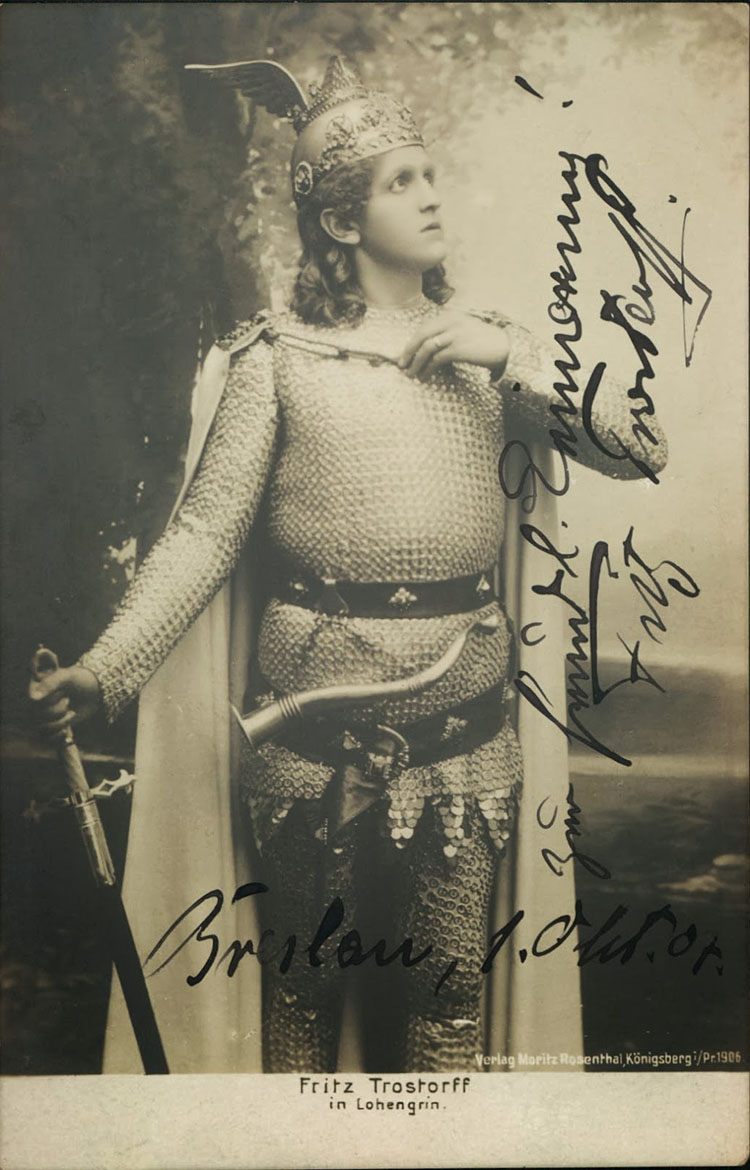Fritz Trostorff

Fritz Trostorff was born on October 29th, 1874 in Ratingen. He studied singing
with the baritone Rudolf von Milde. He started his career in the chorus of the
Zürich opera in 1893 as a bass. In 1894, he went to Weimar and restudied
with the baritone Rudolf Gmür. He developed into a tenor and took acting lessons from
the actor Dagobert Neuffer, who became in 1898 the director of the opera in Metz and had
his protégé make his debut there as Lorenzo. During the celebrations of the 150th
aniversary
of the house, he sang Tristan (February 6th, 1902 – first performance in Metz).
He also
made guest appearances in Trier and Potsdam. In 1902, when singing Lohengrin in
Hannover,
he was praised for his beautiful voice, slim appearance and flexibility
while his quality
of having a voice big enough for the larger opera houses was called into question.
He stayed in Metz
for another two years experiencing highs and lows. On May 4th, 1903
the Bühnenalmanach
announced his death, suicide was even insinuated. It was announced again in 1904
and revoked in 1905. This was probably not an error.
In the prudish city of Metz, it was noticed in 1903 that he was
living together with Lisa Weise and Hermann Sommer, and this led to bad gossip.
Neuffer was relieved when the trio left Metz in 1904. Lisa Weise went to Berlin
and Sommer went
to Aachen. Trostorff went to Königsberg. Immediately, he took part in a Wagner cycle
singing Rienzi, Erik, Tannhäuser, Lohengrin, Tristan, Stolzing, Loge, Siegmund,
Siegfried. In 1906, he moved to Breslau as first heldentenor. Walther Günther-Braun
made guest appearances in Breslau and was used there for the lighter Wagner parts.
In 1913, the director Löwe resigned, and the career of Trostorff seemed to
be nearing his end with the change of management. During the fall of 1913, he still
had success as Rienzi. But he was cancelling very often. Since 1914, the new director
Runge was
looking for a replacement. During spring 1914, Trostorff was the fourth
and most successful Parsifal of the house, according to his supporters, after Hochbein, Gläser and Schmieter.
He retired in 1915 after ten years in Breslau.
It may be that Trostorff continued singing as guest. It is almost impossible
to find out when Trostorff sang for the last time. He was killed during
an air raid over Breslau in 1945,
but it is not known for sure.
Reference: Einhard Luther, So viel der Helden. Biographie eines Stimmfaches, Teil 3: Wagnertenöre der Kaiserzeit (1871–1918), Berlin 2006
While Trostorff's singing is thoroughly unremarkable, his vita is not. His was deeply
rooted in a social democratic milieu, which must have made him feel like an alien in
then German operatic life (where everybody was eager to appear apolitical, and where
almost everybody was, the apolitical self-presentation notwithstanding, fiercely
right-wing). His wife Margot was the daughter of a social democratic politician,
Anna Friedlaender, who was a city councillor in Breslau (today Wrocław), and also at Fritz Trostorff's
home, the social democratic speaker of the German parliament, Paul Loebe, was a
frequent guest. Margot Trostorff being Jewish, Fritz was (like all non-Jewish spouses
of Jews) heavily pressed after the Nazi rise to power to divorce her, which he refused.
This led to his forced retirement as a singer; he made a living for his family as a
voice teacher until he was forbidden to exercise that profession, as well. Their second
son, Klaus, was a member of the anti-Nazi resistance from 1934 on, when he was just 14;
at that early age, he very actively helped (with the approval of his mother) a
well-known Jewish journalist, Paul Riesenfeld, to escape from Germany to Czechoslovakia.
He continued his political work until 1943, when his cover was blown and he was
imprisoned in the Buchenwald concentration camp (he survived). Jewish spouses of
non-Jewish Germans were most of the Nazi era spared from extinction, so Margot Trostorff
could live on with her family in Breslau; in 1944, though, she was conscripted for
digging antitank ditches for the retreating German army, which was of course
life-threatening, and deliberately so. Just before the whole Jewish forced laborer
unit was to be sent to the concentration camp Groß-Rosen, Margot Trostorff escaped,
and returned home to Breslau, where she hided with her husband during the last weeks
of WWII. Just a few days before the war was over, Fritz Trostorff died in allied
bombing; the rest of his family survived.
Reference: Peter Hochmuth/Gerhard Hoffmann (ed.): Buchenwald, ich kann dich nicht vergessen.
Lebensbilder, Berlin 2007, p. 141–149 (the story of the Trostorff family as told by Klaus Trostorff)
Many years ago, I told Einhard Luther that his account of the second half of Trostorff's life was wrong. Now Luther
was just as right-wing as Fritz Trostorff's operatic contemporaries; in an astoundingly aggressive email reply to me, he had
the courage to dismiss Klaus Trostorff's report as "typical GDR propaganda", just because Klaus Trostorff had later been a local
communist politician (mayor of Erfurt) in the GDR, and then long-term director of the Buchenwald concentration camp memorial.
In RA Format
Discography
Odeon, Berlin 1907
xB2621 Meistersinger von Nürnberg (Wagner): Preislied 64641, 25059
xB2623 Freischütz (Weber): Durch die Wälder 64307, 25058
Gramophone, Berlin 1908
12602u Rienzi (Wagner): Allmächt'ger Vater 4-42069
12603u Meistersinger von Nürnberg (Wagner): Morgenlich leuchtend 4-42070
12604u Pagliacci (Leoncavallo): Jetzt spielen 4-42071
12605u Meistersinger von Nürnberg (Wagner): Am stillen Herd 4-42072
0798v Tannhäuser (Wagner): Inbrunst im Herzen 042161
0799v Lohengrin (Wagner): In fernem Land 042162
Discography source: 78opera.com (alas defunct)
Picture source
|